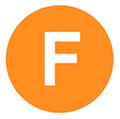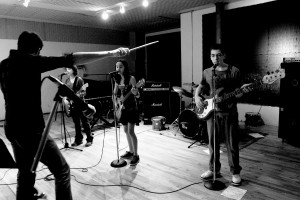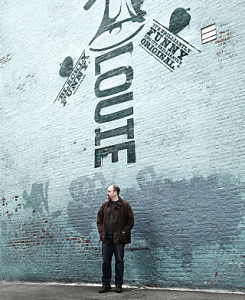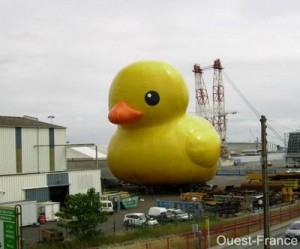 Seeing as DadWagon exists entirely in what the children like to refer to as “Cyberspace,” we figured we would do an interview with an actual Internet guru type. Paul Ford founded the blog Ftrain.com in 1997, when computers still came with worker gerbils running on a wheel. His novel, Gary Benchley, Rock Star, first appeared, in serial form, at The Morning News, where he is a regular contributor. His writing on technology and the imagination has appeared in Harper’s, New York Magazine, and lots of other places that I am too lazy to read. This interview took place a few weeks before the arrival of his twins last week.
Seeing as DadWagon exists entirely in what the children like to refer to as “Cyberspace,” we figured we would do an interview with an actual Internet guru type. Paul Ford founded the blog Ftrain.com in 1997, when computers still came with worker gerbils running on a wheel. His novel, Gary Benchley, Rock Star, first appeared, in serial form, at The Morning News, where he is a regular contributor. His writing on technology and the imagination has appeared in Harper’s, New York Magazine, and lots of other places that I am too lazy to read. This interview took place a few weeks before the arrival of his twins last week.
Theodore: Okay. Here goes: According to your website, you are a “nerd,” someone that people can rely on for accurate information on a wide array of topics. In that light, and given the fact that you are about to be the father of twins, I’m going to ask you to explain (or at least guess) at a few kiddie-related concepts. Here’s the first: elimination communication. Please explain, nerd.
Paul: First, Ted, allow me to say how glad I am to be here and speaking to the fine citizens of DadWagon. Second, elimination communication. This is something I’ve often heard discussed. I know in our insular community of anxious, competitive parents, it’s become quite a thing. And the basic idea is, that, rather than your child being a firehose of pure shit, instead, you can have a deep, intimate interaction with your baby about elimination. In my head, it’s a lot of waving. I think it involves hand signals.But there is one thing I am sure of: People who practice elimination communication are bad people and they live a life of lies. All of them are secretly monsters who enjoy experimenting on helpless babies. EVERY SINGLE ONE OF THEM. ESPECIALLY IN PARK SLOPE>BAD BAD MOTHERS. I kind of want to revise that for maximum rage-induction. Also, DiaperFreebaby.org is looking for a public relations manager. Application SENT.
Theodore: Enlightening! In truth, I didn’t really expect an answer. I just find the word “elimination” to be funny, discomforting, and totally awesome. But that was great. Next up: Baby Yoga: porn, wacko and dangerous practice, or both?
Paul: Oh, wait: Here is the crazy article with the picture of Hannah Rothstein at 7 months that basically SET PARK SLOPE ON FIRE: http://www.nytimes.com/2005/10/09/nyregion/09diapers.html. The Times is the source of all evil.
Baby yoga is basically one step up from cat yoga. Also, babies are incredibly flexible. My biggest fear before becoming a dad was that I’d break baby. But I went over to my friend’s place and he has a seven-month-old and I watched him change some diapers, and I realized, babies are completely bendy. You can wave them around like chicken. But to be totally clear, I am totally fine with baby hatha yoga, but very mixed on ashtanga and iyengar for babies.
Theodore: “Bendy.” Another word I enjoy and hate all at the same time. Last one: please sketch the legal history that allowed us to arrive at “no touch” sunscreen policies in children’s summer camps. Also, please let our readers know if you ever put sunscreen on yourself, which as a male, could legally be considered molestation.
Paul: Wait what? Summer camps? I’m half-Irish. Summer camp meant sitting quietly in the basement waiting for the yelling to stop.
Theodore: Yes. Summer camp. Macaroni art. Socialist sing-alongs. Softball. You’ve worked in media long enough, my friend. As an honorary Jew, you should know from summer camp. But if you wanna pass on that one…
Paul: I do know from summer camp. So the sunscreen thing is weird. Is the issue simply that we don’t want men to rub sunscreen on little boys? The answer here is simple: Sunscreen-applying robots.
Theodore: I like that. I should get one to help keep my Roomba protected from the sun.
Paul: Exactly. I was about to say something about being an honorary Jew, and then I realized that I’m sitting here drinking seltzer in Brooklyn and my half-Jewish wife is in the other room.
Theodore: Okay. Onward. Many of our readers enjoyed your story “Nanolaw with Daughter,” but frankly, I thought that, while well-written, there was a certain naïveté hidden amid the great big piles of click-baited techno-story-telling. You wrote this before the kids came, and it almost sounded as if you thought children were nice, rational, clean little beings with normal questions, instead of the feral hamsters that they actually are. I refer you to the last line of the story:
“One team would win; another team would lose; or they’d tie; or it would rain. All would go home. And days or decades from now, someone will find a way to cull, to merge, to bend the bobbing ponytails to their own ends and use them in some scheme. They will steal that light as if were nothing, as if it were not life itself.”
Pretty. Very pretty. But will this help with elimination hits the fan? Please comment.
Paul: “But will help with elimination hits the fan?” Also, the child in that story was ten.
Theodore: Uh, sorry, I mean, but will your idealism help when the elimination hits the fan.
Paul: Ah, I see. Well, actually, in that story the girl is interested in becoming a lawyer and suing the whole world. She has fantasies of absolute power and control. But the father is only beginning to see and understand them. I wish I could be idealistic, but as you know from our work history together, it’s a sucker’s game. But I’m going to do absolutely everything I can to give both of my children the ability to be the worst little hamster monsters they possibly can.
Theodore: By the way, speaking of half-Jewish, here’s something I researched for my book and was writing about today: The Half-Jewish Network. And it’s not a TV station. The woman who founded it uses the e-mail handle “binary star.”
Paul: OOOOF.
Theodore: Not that that’s relevant, but you mentioned seltzer.
Paul: Of course. Somehow this conversation has ended up being about Jews, Ted. I wonder who made that happen.
Theodore: The media did, Paul. And the bankers. Be afraid.
Paul: Here’s something I reasearched for MY book, which is called “SHUT UP ABOUT JEWS TED.”
Theodore: Ouch. That was the most anti-Semitic thing anyone has ever said to me. You are soooo going in my book now.
Paul: Then who will blurb it?
Theodore: Good point. Okay. So I know you went to the Hershey School as a kid growing up. Is that correct?
Paul: Yes, I graduated from Milton Hershey School in Hershey, Pennsylvania.
Theodore: Can you tell me about that? Because without really knowing much about it, I’m getting Willie Wonka vibes.
Paul: So! No. Not very Wonka-ish. Milton Hershey is a boarding school for poor kids, basically. They dress you and educate you, and you live in student homes. They also gave me money for college. The school controls HerCo, which is the corporation that puts out all the various Hershey brands. Everything did smell of chocolate there. And we spent a lot of time learning about Milton Snavely Hershey and his wife Fanny, who couldn’t have children of their own (one biographer points to Fanny’s syphilitic infertility as a cause, but that’s contested, or at least disliked), so they founded an orphanage.
Theodore: Well, that doesn’t sound horrible at all, which is what I was going for. Let’s move on. Again, we’re doing this interview before you are officially a parent. I’d like you to cast your mind forward, and assuming you’re not superstitious, describe what you think the first week is going to be like.
Paul: Well, there will be two babies. So I expect it to be basically a complete apocalyptic festival of crazy. We are hiring a baby nurse for the first few weeks. Which is a lot like hiring a nanny, but much, much less fraught with social anxiety and confusion. I’ve been told to expect no sleep, and that I will change many diapers. My wife will likely have a C scar. And I probably won’t leave the house much. And everyone has told me at length that poo will run my life. And that there will be multiple colors of poo. Also, wipe front to back for girls. I’ve been told that. And give up any ambitions and hopes you have for yourself, and subvert your sense of identity to these screaming bags of pure hunger and fear. So, a lot like having cats.
Theodore: Maybe you’re less naïve when you’re not blogging, because that sounds about right. A question: How is hiring a baby nurse less fraught with social anxiety and confusion? I’d say illegal labor is illegal labor, my friend. And also, the poo is nothing. It’s all about sleep. Sleep is everything. And yes, that wiping in different directions totally threw me, too.
Paul: Less fraught because it’s only for a few weeks. And we’ve been told it’s cool to pay by check, so I’m assuming SOMETHING is on the up-and-up with our baby nurse scenario (they have a website, too, and references from our friends).
Theodore: I’d like to point out to our readers that you don’t actually live in Park Slope. Can you comment on why not? Don’t you think it’s the ideal environment in which to raise children?
Paul: We live in Ditmas [a gentrifying neighborhood not far away]. And nearly every unit in our building has a stroller in front. And the way that happened is, people were living in Park Slope and they said, “we need more space,” and the realtor said, “It’s $6,000 a month for a two-bedroom,” and BAM, Ditmas.
Theodore: Anyway, so next question. I find that my life as an editor and writer is somewhat less than financially satisfying. Do you have any thoughts about the career choices of your unborn children? I was whispering “stock trader” in the ears of both of my children when I was still a black-and-white blob on the periphery of their undeveloped vision.
Paul: Well, so, you know, I make most of my living as a programmer/consultant-type, right? Because of that problem with writing. My father always said: A man should have both a profession and an avocation. Which, I mean, he was an experimental poet who taught creative writing and wrote weird plays. So, you know, teaching was his profession. So I would encourage my children to be able to do a few things, some that make money, and some that are satisfying, but also hope that they could understand that it can be a fool’s errand to try to make the ones that don’t make money into moneymakers. This will all seem funny when my daughter drops out of law school to be a PA on independent films.
Theodore: Wait, your dad was an experimental poet? Did he ever write anything about you? What the fuck is an experimental poet? How do I not already know about this?
Paul: Sure! He had a number of plays produced and his poems were all over the place.
Theodore: Can you quote from memory, perchance?
Paul: I can do better: He has a blog that he updates every day with a play or story: http://motleycrisp.blogspot.com/
Theodore: Really! Did you get him into that?
Paul: Nah, he did it on his own. He was always good with computers.
Theodore: Nice. Best my dad could do was the Times crossword, in pen. Last one: Would you like to say anything to your babies? Something that they can find some day and understand where you mind was at this particular moment?
Paul: Oh, it’s impossible without being sentimental. There’s just no cleverness in me on that particular subject. Basically, my mind was on the babies. And that’s where it will stay.
Theodore: Good answer.



